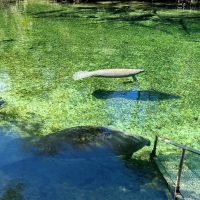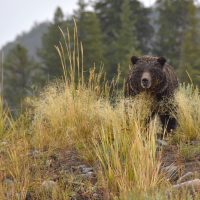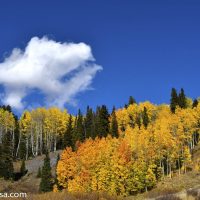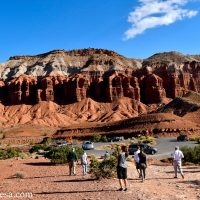The South Rim of the Grand Canyon, located in northern Arizona near the town of Williams along Interstate 40 is an absolute must see destination for anyone traveling that way. Whether you have a week or two to spend, or just a few hours, your time will not be wasted if you just walk out to the rim and look.
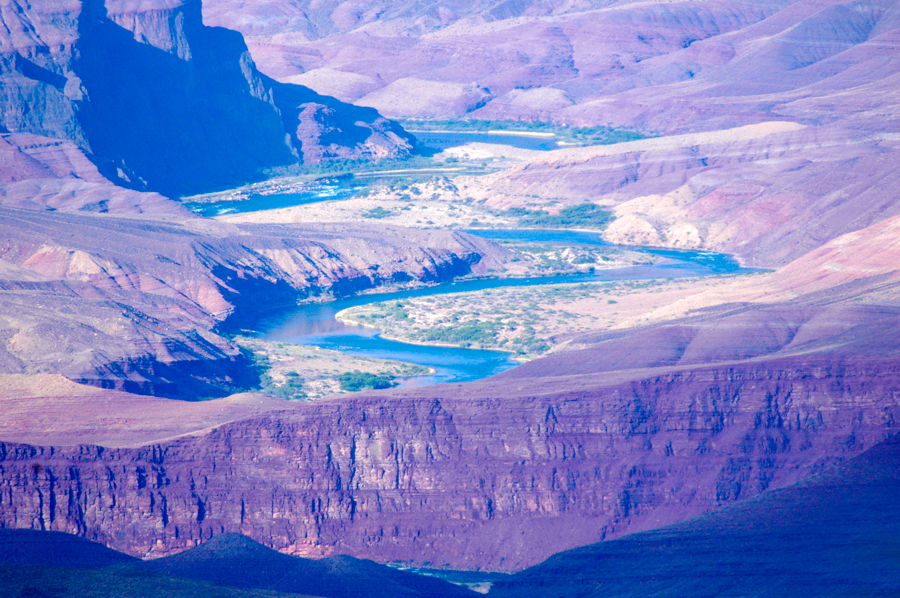
There are many places along the South Rim of the Grand Canyon that afford a great view of the Colorado River. Sometimes, when it’s quiet enough, you can actually hear river below. Photo by Bonnie Fink
Geologically, the canyon is called an “erosion feature” by the official web site. The National Park Service uses the term to help define the difference between the age of the rocks that make up the canyon walls, and the canyon itself. Some of the layers in the bottom of the canyon, for example are known to be about 2 billion years old, but the canyon itself, or the “erosion feature” that exposes those rocks, is only estimated at about 5 or 6 million years. Actually, new evidence discovered by students and professors at the University of New Mexico suggest that the Canyon is actually closer to 11 million years old, in case you’re counting. More on the geology of the canyon can be found in our article about Grand Canyon Geology.
Designated as Forest Reserve in 1893, the Grand Canyon later became a National Monument, and finally a National Park in 1919,only three years after the creation of the National Park Service. Along with parks like Yellowstone, which was the first National Park, Grand Canyon was among those first places to be protected by Congress, signifying its importance and significance.
How to Get There – The easiest way to get to the Grand Canyon via automobile is from Williams, Arizona. Williams is located on Interstate 40 about 30 minutes west of Flagstaff. From Williams, turn north on Highway 64, following signs to the Grand Canyon and drive for about an hour. There’s a small town just before the park entrance called Tusayan where you’ll find a good RV park, several places to shop, eat, and an outstanding Imax theater. There are also several great hotels In this little town, and it’s in good proximity to the main entrance to the park. Another interesting way to visit the Grand Canyon is by traveling to Williams and riding the historic Grand Canyon Railway. More on that in our article about Williams.
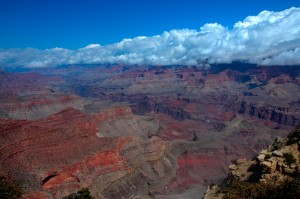
It’s hard to imagine the Grand Canyon as a simple “erosion feature”, but that’s what it’s called. Standing on the rim looking out, it’s at least “an Awesome Erosion Feature”. Photo by Don Fink
Where to Stay – During the summer months the park and surrounding facilities can be quite busy, so this is one destination that’s good to check ahead and have reservations. This applies to just about every kind of facility from tent camping to hotel rooms. For the RVer, one convenient place to stay is the Grand Canyon Camper Village in Tusayan. This RV campground features easy access to the park, full hook-ups including some sites with cable TV, and more primitive sites for the budget minded. Another popular spot is the Trailer Village South Rim Campground, which is located inside the park. Hook-ups are available in some sites.
There are many more RV parks available around the Grand Canyon Area, including some very nice facilities in Williams and along Highway 64. The local KOA is actually about 40 miles from the Grand Canyon entrance. There’s also a great RV park in Williams, associated with the Grand Canyon Railroad, called The Grand Canyon Railway RV Park. Our recommendation is to stay in the Park at the South Rim RV Park if you can get reservations. The next choice would be the Grand Canyon Camper Village in Tusayan.
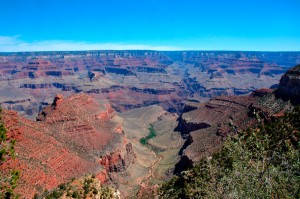
View of Bright Angel Trail, a popular route for people doing the “Rim-To-Rim Hike . The green area down in the canyon is called Indian Springs. Photo by Donald Fink
If you’re staying in a hotel for your trip, we would suggest you consider the Red Feather Lodge, the Grand Hotel, or the Holiday Inn Express, all in Tusayan. We’ve stayed at all three of these hotels over the years, and always had good results.
What to Do – While you’re at the Grand Canyon, your primary activities really need to be a function of how much time you have. If you’re just passing through, as a detour up from another trip along I-40, then you may only have time to drive along the East Canyon Drive. If you have more time, then your adventure may extend to other, more in-depth discoveries; anything from the quick car tour to several days at the canyon floor hiking and rafting.
Most of the 5 million or so visitors each year travel to the south rim via private automobiles. There are two roads along the south rim; one leading out to Hermit’s Rest, eight miles from Canyon Village, and Highway 64 that comes from Williams, enters the park about midway, and runs east for twenty six miles along the canyon’s south rim, exiting at Desert View near the Painted Desert. Most visitors come during the summer, but this is one spot that is also a very good destination in winter months. RVers will find adequate facilities in the town of Tusayan just at the south entrance, or in the park at Canyon Village. Both campgrounds are open in the winter. Folks looking for good deals from one of the many hotels located in Tusayan will be pleasantly surprised at the winter rates.
To see the canyon from an auto, the usual routine is to drive along either West Canyon Drive out to Hermit’s Rest, or East Canyon Drive toward The Painted Desert, east of Desert View. During the summer months, the West Canyon Drive is closed to most private vehicles, and tourists must use the free shuttle busses to view this part of the canyon. As a general rule, this method of viewing the canyon has some interesting advantages. On one recent trip, we found that taking a bus to a turnout, getting off, then hiking along the canyon rim to another bus stop was a fun way of seeing the canyon without having to backtrack. Also, for a popular tourist destination, there were surprisingly few people on the trail, affording a unique opportunity to enjoy the canyon’s views. Bus service is available along the East Canyon Drive too, but unlike the road to Hermit’s Rest, this service is not mandatory.
At the present time, if you don’t wish to use the bus service, you can still access the canyon’s views from the East Canyon Drive. Most turnouts are available to private vehicles, and many have parking for larger vehicles.

Squirrel looking for a handout at the Bright Angel Trail head near Bright Angel Lodge. Photo by donald Fink
What else – If your time is short, the primary activity should naturally be spending time at the canyon rim. There is no way to fully appreciate this unique experience without being there first hand. We can take pictures, shoot videos, write or talk all we want, but this is one case where descriptive narrative and illustrations simply won’t replace the real thing. We can’t adequately describe the experience of standing on the Canyon rim for the first time.
The park has recently constructed a new showcase facility along the East Canyon Drive roadway called the Canyon View Information Plaza. This facility is a state-of-the-art display of the canyon, its features and natural history and just about everything you could want to know about its origin, the people who lived here, and so on. During winter months, or times when tourist traffic is light, you can drive to the Mather Point parking lot and walk the short (about ¼ mile) distance to the plaza. At nearly all times during normal tourist seasons, parking at Mather Point will be impossible. The best next method then is to take a shuttle bus. Both the Village Route Shuttle bus and the Kaibab Trail Route terminate at the Canyon View Plaza. You can catch one of these busses – which run every 15 minutes during peak times – at various places along their route. Make sure you get a bus schedule when you enter the park. It can be helpful.
Without any doubt, the best way to see anything is to get out and walk around, and the Grand Canyon is no exception. The hiking here offers two distinct categories. Hiking along the rim is usually easy and generally available to anyone. All it takes is a bit of planning with a good bus schedule to know where to get off and where to get back on, enough water, and maybe a camera and lunch. The second category of hiking is below the rim. There are many miles of hiking below the rim, and nearly all of it should be considered strenuous. You need to be in good shape before you try one of these trips. The reason is that the most difficult part of all the hiking below the rim is the trip back. Once you get down, you need to have the energy and strength to climb back up. The literature you get from the park service states that you can get a helicopter to airlift you out for medical emergencies, and goes on to say that being “too tired to walk out” is not a medical emergency.
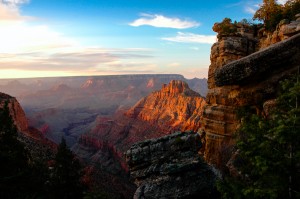
It pays to visit the Grand Canyon at different times of the year, and different times of the day. This image at dusk is quite different than it was at midday. Photo by Donald Fink
Another activity that is well worth the time is the IMax Theater in the town of Tusayan. It seems that at nearly every park and major tourist destination, there’s an IMax theater. This is one of the first, and their numbers indicate that it’s probably one of the most popular too. With nearly 5 million visitors so far, this has got to be one of the longest running shows around. Still, it’s timeless message about the canyon, the stunning vistas it brings up from the canyon floor, and the historical education it conveys are always worth the time to see this great presentation.
Most “below the rim” activities involve either lots of physical exertion, or lots of time, or both. When you think of a hike, for example, you’re usually talking about several days, camping overnight, and so on. Rafting trips bring up thoughts of class 5 rapids and all your gear floating down the river next to your boat because it all went flying as you went through the last rapid. And, while these two examples are certainly obtainable at the Grand Canyon, it doesn’t have to be that way.
At least one tour operator, the Grand Canyon Airlines, offers several different levels of tours. One of their popular tours, called the Grand Voyager Tour leaves from Las Vegas. It flies to the Grand Canyon Airport
Their most popular tour, according to their web site, is the Canyon River Adventure. This tour leaves the Grand Canyon Airport at Tusayan and flies to Page, Arizona. From there, you board a jeep for a tour of Antelope canyon, then a raft for a 15 mile trip down the Colorado River. Finally, you’re returned back to the Grand Canyon airport via bus. This trip, at slightly over $300.00 per person in price, appears to be pretty good value. It offers a taste of the Grand Canyon that simply isn’t achievable in any other way. When you add up the individual activities, this isn’t all that expensive. The tour takes about 12 hours, so it’s a full day’s activity.
If your time is short and you want a better overview of the Canyon, consider a helicopter tour with Papillon Helicopters.
Whether you have just a couple of hours for a quick overview, or a couple of weeks to thoroughly enjoy this magnificent world wonder, think long and hard before you pass up an opportunity to see this unique landscape. It’s true that there are deeper canyons, longer canyons, bigger rivers, but there’s nothing in quite this combination that fuels your imagination and illustrates the true beauty in our natural world.



